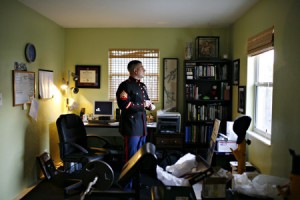War Doesn’t End When They Get Home: War, War Never Changes
 I have a lot of respect for veterans, because they are people who go through experiences that few others have to go through, and many of them suffer because of what they go through. DrBev believes that the war lives on in the soldiers mind, heart, spirit, and emotions for the rest of their lives. They come home changed forever with no possible way of going back to what was. It is not easy to learn to live with the reality of what is, “Now that I am home.” Soldiers have said to DrBev “I feel like I am trapped into emotions that I am working hard to control since leaving Iraq.” DrBev’s reply is that “You are not alone in this and that there is no shame in it.” Here is a story that contains many of the components that soldiers with families, lover, partners, spouses, children, share…
I have a lot of respect for veterans, because they are people who go through experiences that few others have to go through, and many of them suffer because of what they go through. DrBev believes that the war lives on in the soldiers mind, heart, spirit, and emotions for the rest of their lives. They come home changed forever with no possible way of going back to what was. It is not easy to learn to live with the reality of what is, “Now that I am home.” Soldiers have said to DrBev “I feel like I am trapped into emotions that I am working hard to control since leaving Iraq.” DrBev’s reply is that “You are not alone in this and that there is no shame in it.” Here is a story that contains many of the components that soldiers with families, lover, partners, spouses, children, share…
SOLDIER(s) Story: “I can attribute some of it to PTSD since I spent all of 2005 in Kuwait/Iraq. I usually end up raging over something trivial or stupid. I express my rage only rarely and it usually ends up with me destroying or breaking something of mine, not my wife’s or something that belongs to us. I don’t yell, scream, or become violent because I know the reason I rage makes no sense at all, I just rage inside my head. It’s like I’m yelling and screaming and gnashing my teeth in my mind, and I have such violent thoughts when I do these things it scares me. I also am short with my wife when I have an episode, I don’t want to hurt her feelings, sometimes its in my speech, which comes out snippy or short and I don’t mean it to be. I don’t want this to escalate, I’ve used deep breathing techniques, counting, going for a walk alone, and relaxation techniques it just seems that nothing seems to work.”
Do you know that Post-traumatic stress disorder (PTSD) is a debilitating mental disorder that follows experiencing or witnessing an extremely traumatic, tragic, or terrifying event. People with PTSD usually have persistent frightening thoughts and memories of their ordeal and feel emotionally numb, especially with people they were once close to.
Additionally, Americans we are going to have many soldiers returning home in great masses. Is the American public ready? Is the Veterans Administration ready for the influx of returning soldiers? Just for a moment imagine the realities that will present itself because most soldiers and those attached to military combat, in general will experience post-traumatic stress disorder-like symptoms and repeatedly re-live the trauma(s) in the form of nightmares and disturbing recollections during the day. Are we as a society ready to ban together to help those who put their life on the line to keep us safe?
PTSD, once referred to as “shell shock” or battle fatigue, was first brought to public attention by war veterans, but it can result from any number of traumatic incidents. Post-traumatic stress disorder can be treated, usually with a combination of psychotherapy and medications (for specific symptom relief, such as for the common accompanying depressive feelings). People with PTSD should seek out a therapist or psychologists with specific experience and background in treatment post-traumatic stress disorder.
Equally important – and please consider this – Soldiers, and those connected to the soldier, including parent, children, lovers, spouses, partners, siblings need to get yourself into regular therapy to deal with the war experiences and to work out their rage, depression and anxiety.
DrBev is truly sorry that our soldiers are now going through such a hard chapter in their life. However, I do believe that honoring their experiences and making space with personal support, time and therapeutic attention will get the soldier and those associated with him or her to a better place.

Thanks for addressing a subject that affects so many and yet so few want to talk about. It is literally criminal what the VA and the US government are doing to men and women who have believed enough in our country to risk their lives for it. It’s only by talking about it openly that the laws, attitude and policies will change.
its deeper than that…we are prepared when we go threw boot camp to “suck-it-up” to be able to stand trauma, as in a war and tested times. so, the military teaches reconditioning, discipline, responsibility…what it does not teach is,how to relax and release all of the frustrations a soldier goes threw, throughout his/her career as a member. it does not recognize a human, but it does recognize a resilient being, that can bounce back from anything. however, the military is just getting to a point where its sensitive to these conditions, and starting to understand how real they are and how important and relevant therapy has become.
thanks for you post and understanding.
I am currently on active duty, have been diagnosed with PTSD, and i am still serving in fact getting ready for my 3rd deployment. I would like to say thank you for your support and addressing an issue that America is not ready to embrace fully. It is nice to know that i have someone in my corner who is willing to attempt to understand and help. We in the military dont coddle our soldiers to well, and we are just now coming around. We are people too, we are not bullet proof and 6ft tall made of steal, so thank you again.